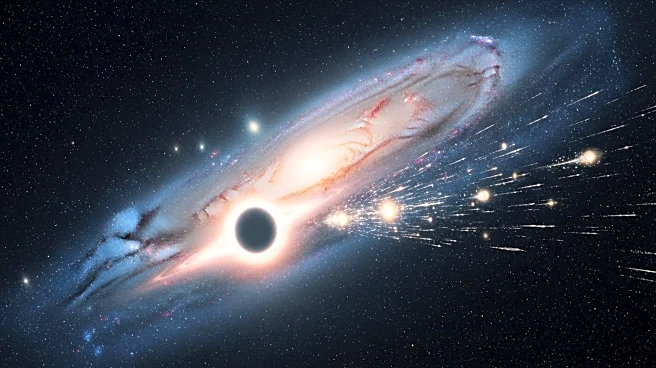What is the story about?
What's Happening?
Physicists Alexandra Klipfel and David Kaiser from the Massachusetts Institute of Technology have proposed a theory that a recent high-energy neutrino event, named KM3-230213A, could be explained by the evaporation of a primordial black hole. This event, which involved a particle smashing into Earth with an unprecedented energy of 220 petaelectronvolts, might be the result of Hawking radiation emitted as the black hole evaporated. Primordial black holes are theorized to have formed from quantum fluctuations shortly after the Big Bang, and while their existence has not been confirmed, they are thought to self-destruct quickly. The researchers suggest that if primordial black holes constitute a significant portion of dark matter, some may still exist and be nearing their end, potentially explaining the observed neutrino events.
Why It's Important?
The significance of this research lies in its potential to provide observational evidence for Hawking radiation, a phenomenon that has been theorized but not yet observed. If primordial black holes are indeed responsible for these high-energy neutrino events, it could offer insights into the nature of dark matter and the early universe. This discovery could also advance our understanding of particle physics and cosmology, potentially leading to new experiments and observations. The possibility of detecting Hawking radiation and confirming the existence of primordial black holes would be a major breakthrough in theoretical physics.
What's Next?
The researchers have calculated that the explosion of a primordial black hole could occur within 2,000 astronomical units of Earth, with a probability of just under 8 percent. This suggests that further observations and experiments could potentially confirm their hypothesis. Additionally, another study predicts a 90 percent chance of detecting an exploding primordial black hole within the next decade. As detection capabilities improve, scientists may be able to gather more evidence to support or refute these theories, potentially leading to significant advancements in our understanding of the universe.
Beyond the Headlines
The implications of this research extend beyond the immediate findings. If primordial black holes are confirmed as a source of high-energy neutrinos, it could reshape our understanding of dark matter and the composition of the universe. This could lead to new theories about the formation and evolution of cosmic structures. Furthermore, the detection of Hawking radiation would validate a key aspect of quantum mechanics and general relativity, potentially influencing future research in these fields.















